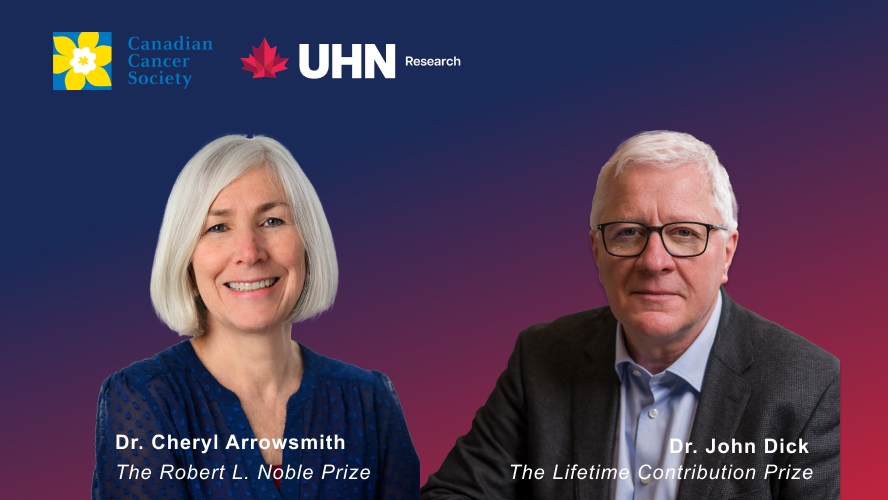
Two researchers from UHN’s Princess Margaret Cancer Centre are recipients of the 2024 Canadian Cancer Society Awards for Excellence in Cancer Research. Congratulations to Senior Scientists Dr. John Dick and Dr. Cheryl Arrowsmith on this achievement.
● Dr. John Dick – 2024 Lifetime Contribution Prize: This prize celebrates investigators who have enhanced the Canadian cancer research landscape beyond traditional research accomplishments—leading to significant benefits for people in Canada affected by cancer—and who are committed to passing that legacy on to the next generation of cancer researchers.
Dr. John Dick is a Senior Scientist at Princess Margaret Cancer Centre, a Professor in the Department of Molecular Genetics at the University of Toronto, and holds both the Helga and Antonio De Gasperis Chair in Blood Cancer Stem Cell Research and the distinction of University Professor at the University of Toronto. Dr. Dick has spent a lifetime studying how cancer works. His accomplishments range from discovering the cells that give rise to leukemia to developing new cancer treatments and finding ways to measure their success. He generated the first system for effectively studying human stem cells in the lab, enabling him to uncover how human blood develops and identify the unique stem cells that lead to cancer. His work has revealed processes that can be targeted by new drugs to stop cancer and prevent relapse.
● Dr. Cheryl Arrowsmith – Robert L. Noble Prize: This prize recognizes the outstanding achievements of Dr. Arrowsmith in biomedical cancer research.
Dr. Arrowsmith is a Senior Scientist at Princess Margaret Cancer Centre, a Professor in the Department of Medical Biophysics at the University of Toronto, and Chief Scientist at the Structural Genomics Consortium Labs affiliated with UHN and the University of Toronto. Dr. Arrowsmith studies how genes and proteins work together in cancer, with a focus on how genes are controlled in the human body—a process called epigenetics—and how the proteins that influence this control interact to drive cancer. She also develops chemical probes to study these proteins and identify potential targets for new anticancer drugs. Her work has provided essential drug discovery tools for the scientific community. She is also a strong advocate for new drug discovery and development, as well as a mentor and supervisor to many trainees.
Read the full story here.




